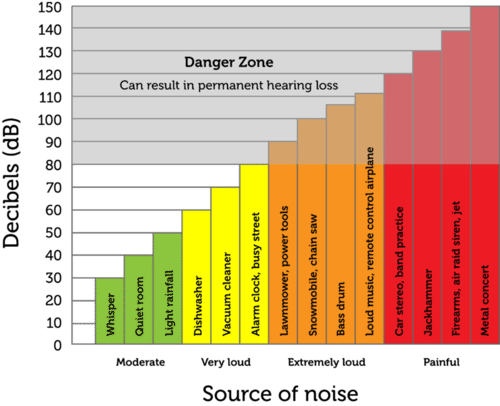Intensity And Loudness Of Sound Study Guide
INTRODUCTION
When a friend speaks to you in hushed tones, you may need to lean in close to hear what they’re saying. Similarly, if your friend calls out to you from across the gymnasium. Even though they’re several meters away, their voice is now loud enough for you to plainly hear them! It is safe to say that the volume of sounds can fluctuate.
A listener’s perception of how loud or soft a sound is referred to as loudness. The strength of the sound waves determines the loudness of the sound. The quantity of energy in sound waves is measured by intensity. A decibel is a measurement of intensity (dB).
DECIBEL LEVELS
The graph below depicts the decibel levels of various sounds. Sound waves get more intense, and noises become louder as decibel levels rise. Loudness increases by ten times for every ten-decibel increase in sound intensity. As a result, a 30-decibel “silent” room is ten times louder than a 20-decibel whisper, and a 40-decibel gentle rainfall is 100 times louder.
Remember: Sounds with a high decibel level are hazardous. They can harm the ears and cause hearing loss.
DIFFERENCE BETWEEN LOUDNESS AND INTENSITY
| Loudness | Intensity |
| The ear’s response to sound is measured by its loudness. | The sound power per unit area is known as intensity. |
| Decibels are used to measure loudness. | Watt per meter square is the unit of measurement for intensity. |
| The sensitivity of the human ears determines how loud something is. | The sensitivity of the human ears has no bearing on the intensity. |
| Loudness is a personal preference. | The term “intensity” refers to a numerical value that can be measured. |
SUMMARY
- A listener’s perception of how loud or soft a sound is is referred to as loudness. The intensity, or quantity of energy, in sound waves determines the loudness of the sound. The decibel is a measurement of intensity (dB).
- Sound waves get more intense, and noises become louder as decibel levels rise. Loudness increases by ten times for every ten-decibel increase in sound intensity.
- The amplitude of the sound waves and the distance they have traveled from the source of the sound determines the intensity of the sound.
FAQs
Q. What does the loudness of a sound depend on?
The loudness of a sound wave is determined by its amplitude. A loud sound has a bigger amplitude, while a soft sound has a lesser amplitude.
Q. Does sound intensity depend on frequency?
The energy per second that a wave can send to a unit area of a surface is measured by its intensity. (Watts per square meter is the unit of measurement for intensity.) The vibration rate equals the frequency of a sound wave, and the intensity is determined by the amplitude.
Q. Does intensity change when a sound gets louder?
The intensity of the sound increases as the amplitude of the sound wave increases.
We hope you enjoyed studying this lesson and learned something cool about the Intensity and Loudness of Sound! Join our Discord community to get any questions you may have answered and to engage with other students just like you! We promise, it makes studying much more fun!😎
REFERENCE
- Distinguish Between Loudness and Intensity of Sound: https://byjus.com/questions/distinguish-between-loudness-and-intensity-of-sound/ Accessed 14th April 2022.
- Intensity and Loudness of Sound: https://flexbooks.ck12.org/cbook/ck-12-physics-flexbook-2.0/section/12.3/primary/lesson/intensity-and-loudness-of-sound-ms-ps/ Accessed 14th April 2022.


